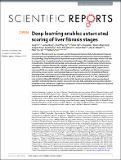Deep learning enables automated scoring of liver fibrosis stages
Author(s)
Yu, Yang; Wang, Jiahao; Ng, Chan Way; Ma, Yukun; Mo, Shupei; Fong, Eliza Li Shan; Xing, Jiangwa; Song, Ziwei; Xie, Yufei; Si, Ke; Wee, Aileen; Yu, Hanry; Welsch, Roy E; So, Peter T. C.; ... Show more Show less
Downloads41598-018-34300-2.pdf (2.294Mb)
PUBLISHER_CC
Publisher with Creative Commons License
Creative Commons Attribution
Terms of use
Metadata
Show full item recordAbstract
Current liver fibrosis scoring by computer-assisted image analytics is not fully automated as it requires manual preprocessing (segmentation and feature extraction) typically based on domain knowledge in liver pathology. Deep learning-based algorithms can potentially classify these images without the need for preprocessing through learning from a large dataset of images. We investigated the performance of classification models built using a deep learning-based algorithm pre-trained using multiple sources of images to score liver fibrosis and compared them against conventional non-deep learning-based algorithms - artificial neural networks (ANN), multinomial logistic regression (MLR), support vector machines (SVM) and random forests (RF). Automated feature classification and fibrosis scoring were achieved by using a transfer learning-based deep learning network, AlexNet-Convolutional Neural Networks (CNN), with balanced area under receiver operating characteristic (AUROC) values of up to 0.85–0.95 versus ANN (AUROC of up to 0.87–1.00), MLR (AUROC of up to 0.73–1.00), SVM (AUROC of up to 0.69–0.99) and RF (AUROC of up to 0.94–0.99). Results indicate that a deep learning-based algorithm with transfer learning enables the construction of a fully automated and accurate prediction model for scoring liver fibrosis stages that is comparable to other conventional non-deep learning-based algorithms that are not fully automated.
Date issued
2018-10Department
Massachusetts Institute of Technology. Department of Biological Engineering; Massachusetts Institute of Technology. Department of Mechanical Engineering; Sloan School of ManagementJournal
Scientific Reports
Publisher
Nature Publishing Group
Citation
Yu, Yang, Jiahao Wang, Chan Way Ng, Yukun Ma, Shupei Mo, Eliza Li Shan Fong, Jiangwa Xing, et al. “Deep Learning Enables Automated Scoring of Liver Fibrosis Stages.” Scientific Reports 8, no. 1 (October 30, 2018). © 2018 The Authors
Version: Final published version
ISSN
2045-2322